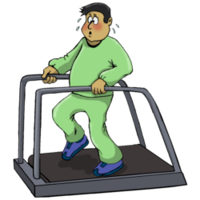Mindless Eating
One of the keys to any successful weight management strategy is awareness:
- Awareness of our bodies
- Awareness of our bodies’ needs
- Awareness of what we are doing physically
- Awareness of what we are eating
- Awareness of the impact of food on our bodies and our minds
- Awareness of the content and consequences of our diets
- Awareness of our eating on other people
- Awareness of our food choices on animals and our physical and emotional environment
- Awareness of the things that drive us to eat even if we are not hungry
- Awareness of the spiritual consequences of eating
I have looked at hundreds of books on diet, health and nutrition and it constantly astonishes me that hardly any of them address this central component, not just of weight management, but of life management. There is some fine exceptions: one is a new book by Brian Wansink called Mindless Eating, that does a good job of discussing some of these problems of awareness about eating.
The author is a practicing researcher and Professor at Cornell, and he has an interesting paper in the current issue of the Journal of Marketing Research. Part of his thesis is that “low fat” nutrition labels may lead to the over-consumption of nutrient-poor and calorie-rich snack foods.
I was pleased to see the experimental data, which exactly confirms my observations. After nearly thirty years of working with people with weight challenges, one of the more common problems is that some people have been brain washed into thinking that if it says “low fat” on the label, you can eat as much as you want. The trouble is that if you know how to read labels, some of the low fat foods are also low health foods. The authors of the paper make some good suggestions for changing policy to help rectify the situation.
When it comes to what we eat, part of the problem is that most of us are so comfortable with the status quo that we rarely notice much that is going on inside or around us.
A fish only becomes aware that it lives in water once it’s dragged up on shore!
And we only realize our own potential for growth and change when we become aware of the dynamic, interconnected beauty and complexity of a world that lies just beyond the reach of our senses.
Growing our awareness of food, nutrition and eating can be a transformative experience. I have known some spiritual teachers who would not accept heavy people as students, saying that if they could not even control their weight, then how could they control their minds or any energies that might be released from meditation, qigong, yoga and the like?
Although I understand what they are saying, I respectfully disagree. As I have discussed many times, there are physical as well as psychological, social, subtle and spiritual reasons for having trouble with weight, and I don’t think that these are grounds for excluding people from learning these practices.
For today I urge you to spend a few minutes working on your own “Ten Awarenesses” about food and nutrition.
It could be the best thing that you do for yourself all year.
“Neither the body with its senses nor the mind with its thoughts is the ultimate being that I am. The body acts and the mind moves, but behind them is the thought-free Awareness, the Knowing Principle.”
–Paul Brunton (English Spiritual Teacher and Author, 1898-1981)
“The voyage of discovery lies not in finding new landscapes, but in having new eyes.”
–Marcel Proust (French Novelist, 1871-1922)
Do Healthy Foods Taste Bad?

There is a valuable study in the Journal of Marketing, which I must confess is not normally on my overloaded reading list. At least it wasn’t until I discovered an astonishing number of articles that are highly relevant to our basic themes of Health, Integrated Medicine, Meaning and Purpose.
We are all constantly puzzled by the way in which so many people seem to enjoy unhealthy foods. This is a matter of enormous importance: countries like China and India are now getting fattest the fastest, partly because of their peoples’ craving for Western junk food, coupled, in many cases, with a metabolic inability to process the food in the same way that most Europeans do.
Well, according to this study, foods that we think are healthy taste worse. This is the “unhealthy = tasty intuition.” In one of the experiments, test subjects were offered a mango lassi, an Indian yogurt drink that has the consistency of a thick milkshake. Those who were told that the lassi was “unhealthy” liked the drink significantly more than those who were told the drink was “healthy.”

When I was a young student one of my teachers told me that patients always believe that if something tastes foul then it must be doing them some good. A lesson that I had learned from my grandmother when still a small child. By the age of five I already knew that any rash or snivel would mean having to take some pungent and disgusting potion: some secret recipe that had been in the family for generations. Even then I wondered how it was that so many family members had lived to great ages. It didn’t seem possible.
This research fits in with the teachings of my grandmother and my professor. People assume an inverse relationship between tastiness and healthiness. In the study people believed that what they were consuming was unhealthy, they guessed that it would taste better, be more enjoyable to eat and that they would be more likely to choose it in a test.
This is important research and has a number of practical implications for helping people to adopt more healthy eating patterns.
This reminded me of a salutary lesson. Some years ago I spent a very happy year doing a part time course in wine tasting. Fascinating topic taught by Masters of Wine who said that they could tell incredible things about a wine after the smallest taste. A couple of years ago such claims were put to the test in Bordeaux in France, which is, of course, famous for its wines. In the first experiment 54 acknowledged wine experts were asked to give their impressions of two glasses of wine: one white and one red. The wines were actually the same white wine, one of which had been tinted red with an odorless food coloring. But here it gets interesting: the experts described the “red” wine in language typically used to describe red wines. For instance one said tat the colored wine had a “flavor of crushed red fruit.” Not a single one noticed it was actually a white wine.
In a second experiment an inexpensive wine was presented to the experts in two different bottles, one fancy and one plain. The experts gave the two bottles completely different evaluations. The experimenters described their results in terms of the interaction between vision of colors and odor determination. But we can also interpret the data in terms of expectation and perspective. If we expect something to taste good it tends to do so. Yes of course you can get a nasty surprise, but there is a powerful subjective component in how we interpret sensations.
I strongly suggest that you analyze your own reactions to food. Do you believe that healthy foods have to taste awful?
This may be an important key to changing your own eating patterns.
“Life expectancy would grow by leaps and bounds if green vegetables smelled as good as bacon.”
–“Doug Larson”
“As for food, half of my friends have dug their graves with their teeth.”
–Chauncey M. Depew (American Politician and, from 1899-1911, Senator from New York, 1834-1928)
“To lengthen thy life, lessen thy meals.”
–Benjamin Franklin (American Author, Inventor and Diplomat, 1706-1790)
“If you have formed the habit of checking on every new diet that comes along, you will find that, mercifully, they all blur together, leaving you with only one definite piece of information: french-fried potatoes are out.”
— Jean Collins Kerr
(American Author and Playwright, 1923-2003_
Common Misconceptions About "Weight Loss" Supplements
My recent comments about chromium, the penalties handed down over false weight loss claims and my inability to find any support for an apparent claim concerning probiotics and weight gain, have lead to a flurry of questions and helpful responses.
By far the most common has been surprise. Most people assumed that:
- These dietary supplements are regulated and that:
- They are therefore safe and
- They have had to demonstrate that they are effective
In fact all of those three assumptions are wrong.
I have just found a most helpful article that you can download for free.
Last October at the 2006 Annual Scientific Meeting of NAASO – the Obesity Society – the results of a collaborative research program by the University of Connecticut’s Center for Survey Research & Analysis (CSRA) in Stamford, Connecticut and the University of Pennsylvania’s Center for Weight Loss and Eating Disorders in Philadelphia were presented. GlaxoSmithKline (GSK) Consumer Healthcare funded the study.
Findings from this first national survey on the safety and regulation of dietary supplements for weight loss include:
- 65% believing that weight-loss products are tested for safety
- 63% believing that weight-loss products are tested for effectiveness
- 54% believing that weight-loss products are approved by the FDA
- 64% believing that manufacturers are required to include warnings about side effects
- 50% of African Americans and 49% of Hispanics were more likely than Whites of European origin (36%) to believe supplements are safer than OTC or prescription weight-loss drugs
Congressman John Dingell from Michigan has indicated that the new Congress will be re-visiting the issue of the FDA’s regulation of some of these supplements.
That would probably be wise.
Though as a very firm advocate for health freedom, I always worry when new regulations are proposed, simply because they sometimes lead to the baby being ejected with the bath water.
I shall continue to watch this developing story and to let you know how things develop.
Dogs, Diet Pills and Healthy Eating

Pfizer Animal Health announced today that the Food and Drug Administration (FDA) has approved Slentrol(TM) (dirlotapide) for the safe and effective management of canine obesity, making it the first and only veterinary-approved obesity drug for dogs in the United States.
Because of our intense interest in metabolism, we have been tracking the rise in canine obesity since 2001. Wild dogs do not get fat, but under-exercised canines given the wrong food rapidly do. Many owners think that they are too busy to exercise them and many neighborhoods either have no side walks or are simply not safe for a walk. Having just received multiple bags and boxes of food, I can also attest to something else: we often equate food with love – without being aware of the potential adverse health consequences.
According to 2002 data from the American Veterinary Medical Association 40 percent of dogs – around 17 million – are considered overweight (5 percent to 20 percent over ideal weight) or obese (20 percent or more over ideal weight).
Depending on the species, our canine friends get many of the same problems that we associate with overweight in humans: arthritis, heart disease, respiratory conditions and some cancers. Obesity can also worsen the signs associated with pre-existing diseases such as osteoarthritis. In addition, obesity can affect a dog’s quality of life by making exercise and play more difficult or even impossible.
The medicine is, quite rightly, designed to be used with a diet and exercise plan.
This new medicine does appear to be a real advance, and its mode of action very interesting. Indeed I am at this moment looking at a dog who might benefit!
But I also notice that a number of news outlets have reproduced the Pfizer press release verbatim, and presented it as a news item.
What Pfizer said is 100% accurate, but when the media reporduce something without comment I worry that this is an example of “fake news.“
It is interesting to me that this story was released two days after the release of a report from researchers at the University of Alberta Hospital that has just been published in the Lancet.
Their conclusion? That we need better data on the long-term effects of anti-obesity drugs before more widespread use of the therapies. We need to know not just if a medicine leads to weight loss, but whether it leads to clinical benefit. We saw this with the recent tragedy with the medicine torcetrapib. This was a medicine designed to increase levels of HDL-( “good”) cholesterol. Indeed it does, but more people taking it died in a clinical trial, which was then stopped.
I am often asked, “Wouldn’t it be great if we could do anything that we wanted and then to take a pill to cancel out the effects?”
The answer to that one is surely a big, “No!”
Fortunately such a solution – which would destroy personal responsibility – seems to be years in the future.
If ever.
We MUST take responsibility for the things that we do.
To do anything less is to accept the fantasy that we are no more than machines at the mercy of our brain cells.
We are all far more than that.
And deep down we all know it.
Probiotics: Caveat Emptor Part 2
After I posted about the new data on the apparent importance of intestinal microorganisms and weight management, I received some very helpful comments and emails.
If you look at the "comments" section of the post, you will see this:
"www.Probiotic-Lab.com is manufacturing and distributing Bacteroidetes as a natural bacteria supplement for weight loss."
Posted by an "R.Russell"
Now I have previously reported on a conference in London at which a number of experts expressed concern about some probiotics available in the United Kingdom. So on your behalf, I not only posted the following response, but also emailed the company. First, because there is nothing on their website about marketing probiotics for weight loss and second because it is important to have these questions answered whether they are marketing probiotics for weight loss or for skin care.
This is what I wrote on the blog and also in my email to the company:
On behalf of my many readers may I ask www.Probiotic-Lab.com two questions?
1. In my posting I referred to a short piece that I wrote about a conference in London, at which some of the speakers warned that some products on the market did not contain the active ingredients claimed on the label. How do you guarantee the activity of your preparations?2. Though I am very familiar with the use of probiotics – I first used them in, I think, 1982 – I am intrigued that you are already distributing Bacteroidetes as a natural bacteria supplement for weight loss. What evidence do you have that they are effective? I could not find anything on your website or from a search of the literature. If you have some data to share I would love to analyze it, and if it’s of good quality I will go ahead and write about it, both here and in my articles.
Kind regards,
RP
I wanted to give them time to respond because of the holidays.
But as of today – seventeen days later – there has still been no response to my communications.
I also checked the scientific references on the front page of Probiotic Lab’s website. The first does not have anything to do with weight or skin infections, but actually refers to a study of ear infections. The second reference is problematic: it refers to the "American Medical Journal." But sadly I am not familiar with a journal of that name. I have looked at a range of American Medical Journals in case the journal name or date is wrong. But again I can find nothing.
I shall be delighted if someone can help.
I also looked to see if there is any published peer-reviewed literature on the use of probiotics and either weight management or skin disease, and again I have not been able to find anything.
So you can draw your own conclusions.
Should any data come to light I shall report it. Or if the company responds, I shall post what they say.
The Price of False Weight Loss Claims
It has just been reported that this afternoon the United States Federal Trade Commission has recovered more than $25 million ro settle allegations of deceptive marketing for four products:
- Xenadrine EFX
- CortiSlim
- TrimSpa
- One-A-Day WeightSmart
This is not a surprise. For anyone with any knowledge of human metabolism some of the claims made in television and print advertisements were really far-fetched.
The fines may sound large, but are probably just a drop in the bucket for the companies.
This legal action is all about false claims, but there is another worry, and that is that some of the alleged weight-loss products may also have side effects. Two months ago I mentioned that there are currently investigations underway of at least two people who appeared to have developed manic symptoms while on Cortislim. It remains to be seen if there is a causal relationship.
Pretty much ANYTHING will help you lose weight in the short term. But if these products really worked and were safe, then why on earth wouldn’t doctors and nurses be using them themselves and prescribing them to their patients?
Sad to say weight loss does not come in a bottle: I only wish that it did!
Stick with the principles of gradually modifying your diet, exercise and be aware of the psychological traps that can sabotage healthy living. And please don’t waste your money on quick fixes that cannot possibly work.
If it seems too good to be true, then it probably is.
Exercise Beats "Dieting" in Managing Obesity

An important report was presented at the Scientific Meeting of the United Kingdom Society for Behavioural Medicine in Cambridge earlier this month.
A team of researchers from Leeds Metropolitan University and the University of Hull studied 62 women aged 24 to 55. They all had a Body Mass Index (BMI) over 30, which is classed as clinically obese. (Regular readers will know that most experts have moved away from using BMI to evaluate metabolic and cardiovascular risks).
The program encouraged women not to diet but to take part in exercise classes. They were required to do four hours a week of exercise, such as t’ai chi, aqua aerobics or circuit classes. So it was not necessary to become a hard core exercise freak!
The researchers found significant improvements in health and mental well-being.
The women in the study were also taught about good eating habits, including how to read food labels and cook food, and they received social support and behavioral therapy to help them respond to body cues such as hunger and feeling full.
After a year, the women had only lost a little weight but were significantly fitter and happier with themselves. Their blood pressure, heart rate and cholesterol fell and respiratory fitness increased. And the women also felt better in terms of general well-being, body image, self-perception and stress.
This small, simple study re-emphasizes what we have said to tens of thousands of people: fad diets will only help in the short term. For all practical purposes you can eat what you want, but in moderation. But try gradually to change the composition of your diet. I have written some advice on doing that. In Healing, Meaning and Purpose we also provide a number of tactics to help you tackle some of the psychological and social hurdles that may stand in the way of weight management. Which include something not often discussed: the twelve ego-fears that can be the hidden drivers to a lot of our behavior.
Understand them and you can gain a remarkable degree of control of your thinking and your emotions.
And it is exercise that should be the centerpiece of a weight management strategy.
This was re-inforced by a study published last week in the Archives of Internal Medicine: people who lost weight by restricting calories lost bone mineral density. Those with exercise-induced weight loss did not.
And as you doubtless know, loss of bone mineral density is one of the key risk factors for osteoporosis.
So please don’t buy in to some new “miracle” diets: they simply don’t exist.
Instead:
- Gradually increase your level of exercise
- Slowly change the composition of your diet
- Keep your internal organs – especially your intestine – in balance
- Develop your food awareness (I am going to do a whole post/article about that!)
- Learn how to deal with the psychological, social subtle and spiritual aspects of suboptimal eating (Check out the reources that I have already provided + a new eBook in the New Year)
And before you know it, you will be exactly where you want to be.
Promise!
Lack of activity destroys the good condition of every human being, while movement and methodical physical exercise save it and preserve it.”
–Plato (Athenian Philosopher, 428-348 B.C.E.)
“The way to cheerfulness is to keep our bodies in exercise and our minds at ease.”
–Sir Richard Steele (English Dramatist and Essayist, 1672-1729)









